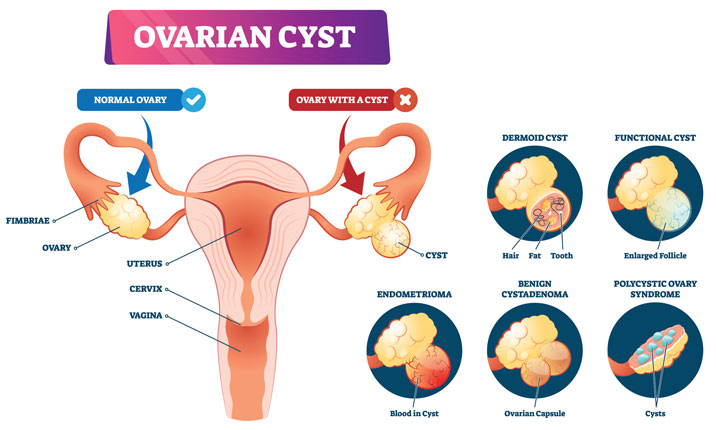Cyst on ovaries is a common health issue with women and is most likely to happen during their reproductive years. In most cases of ovarian cysts, they are harmless, some might even not cause symptoms so women do not even know they have them. They are small fluid-filled sacs like a blister that can form on ovaries as the woman goes through the cycle of menstruation. There are some that can become cancerous and some that are non-cancerous. The latter often may not even need treatment and go away by themselves, but serious cases of cysts cause some more worrying symptoms and in a small percent can be fatal.
Ovarian cyst types
The five main types of cysts are as follows;
- A Cystadenoma cyst – these develop on the ovary’s outer surface.
- A functional cyst – a normal cyst that can develop during ovulation. More likely to affect younger women in their first few menstruation cycles but then disappear after that.
- A dermoid cyst on ovaries – these are ovarian cysts that then develop filled with not just fluid but also different tissues like skin and hair.
- An endometrioma cyst – is a cyst that forms when a tissue that is similar in nature to the uterus lining, attaches to the woman’s ovaries.
- Polycystic disease – this is where there is a build-up of follicle cysts that leads to the ovaries thickening and becoming overly large that then causes a thick outer coating over the ovaries and interrupts the ovulation process. These cysts can impact women who are trying to get pregnant.
Symptoms more commonly seen
As mentioned there are a lot of women that have completely benign cysts on ovaries with no symptoms of them at all. Cysts that burst, bleed or grow larger are more likely to cause irritation and noticeable symptoms. The more common symptoms when they are experienced include;
- Pressure in the stomach or pelvic area
- A dull ache
- Pain when having intercourse
- More severe pain in the stomach or pelvic area
- Delayed, painful and irregular periods
- Having problems emptying your bowels
- Feeling the need to urinate more frequently
- Bloating
- Feeling overly full when you have barely eaten
- Having trouble getting pregnant
Treating ovarian cysts
The treatment for ovarian cysts really depends on their type, size and what symptoms there are causing. There are several options including a number of medications, before things like surgery are considered unless dealing with a cancerous cyst. Doctors will often suggest with non cancerous smaller cysts to have the wait and see approach. The pain and other symptoms can be helped by;
- Taking over the counter pain relief
- Having a warm bath to relax tense muscles and improve blood circualtion
- Drinking certain teas can help ease the pain and relax tense muscles too
- Eating a healthy diet and being active at least 3 times a week
- Urinate when you feel it rather than trying to hold it
- Taking a contraceptive pill can help with the hormones

